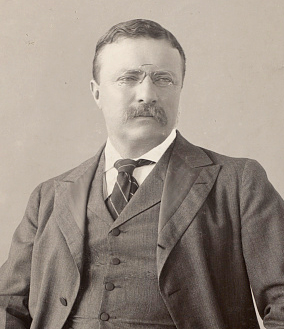|
|
Messages and Papers of Theodore Roosevelt
Contents:
Messages and Papers of
THEODORE ROOSEVELT
Messages, Proclamations, and Executive Orders,
September 14, 1901 to March 4, 1909.

THEODORE ROOSEVELT, the twenty-sixth President of the United States, was born in the city of New York, October 27, 1858. His ancestors on the paternal side were of an old Dutch family, and on the maternal side, of Scotch-Irish descent. His early education was received under private tuition. He was graduated from Harvard College in 1880, and spent the following year in study and travel. From 1882 to 1884 he was a member of the Assembly of the State of New York as an independent Republican, and gained a wide reputation for his work for political reform, particularly in the field of the civil service. In 1884 he was chairman of the New York delegation to the National Republican Convention, and two years later was an unsuccessful candidate as an independent Republican for the office of Mayor of New York. He was made a member of the National Civil Service Commission by President Harrison in 1889, and served as president of the board until May, 1895, when he resigned to become president of the board of Police Commissioners of the city of New York. In 1897 he was made Assistant Secretary of the Navy by President McKinley, but on the breaking out of the Spanish-American War, in 1898, he resigned and organized the First United States Volunteer Regiment of Cavalry, popularly known as the "Rough Riders," of which he was made lieutenant-colonel. He was attached to the army of General Shafter, for the invasion of Cuba, and participated in every engagement preceding the fall of Santiago. He won distinction at the Battle of San Juan Hill, on July 1, 1898, and was promoted to the rank of colonel on July 11, for conspicuous bravery in action. He received the nomination for governor of New York on the Republican ticket, September 27, 1898, and was elected by a large plurality. At the Republican National Convention held in Philadelphia, in June, 1900, he was nominated for Vice-President of the United States, William McKinley being the candidate for President, and was elected. The shooting of President McKinley on September 6, 1901, proved fatal on September 14 following, and the Vice-President took the oath of President before Judge John R. Hazel, at Buffalo, N.Y., on that day. He was nominated for President of the United States by the Republican National Convention which met at Chicago, June 21, 1904, and was elected. Some of the important achievements of President Roosevelt during his administrations have been: the settlement by arbitration of the Anthracite Coal Strike, in 1902; the reorganization of the Army and the National Guard; the recognition of the Republic of Panama; the negotiationof a treaty with the Republic of Panama for the building of the Panama Canal; and the restoration of peace between Russia and Japan, consummated by the Treaty of Portsmouth. During his administrations President Roosevelt has made speaking tours which have included every State and Territory in the Union, and in his speeches he has been an earnest advocate of an adequate navy; the protection of the forests of the country; the extension of irrigation; and the enlargement of the powers of the Federal Government in controlling interstate commerce.
Contents:
Chicago:
Theodore Roosevelt, "Title Page," Messages and Papers of Theodore Roosevelt in 6638. Original Sources, accessed November 4, 2025, http://originalsources.com/Document.aspx?DocID=RYFQ5ICR7BS8VD2.
MLA:
Roosevelt, Theodore. "Title Page." Messages and Papers of Theodore Roosevelt, in , page 6638. Original Sources. 4 Nov. 2025. http://originalsources.com/Document.aspx?DocID=RYFQ5ICR7BS8VD2.
Harvard:
Roosevelt, T, 'Title Page' in Messages and Papers of Theodore Roosevelt. cited in , , pp.6638. Original Sources, retrieved 4 November 2025, from http://originalsources.com/Document.aspx?DocID=RYFQ5ICR7BS8VD2.
|